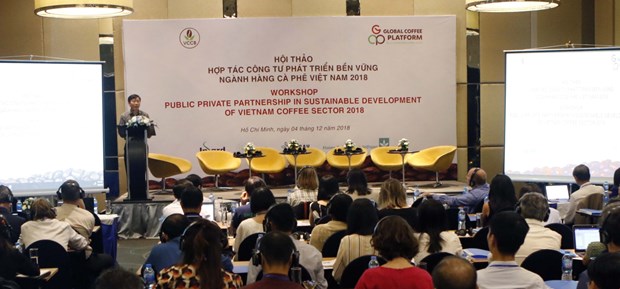PPPs urged to develop coffee sector sustainably
A workshop was held in Ho Chi Minh City on December 4 to seek measures for boosting public-private partnerships (PPP) towards sustainably developing Vietnam’s coffee sector – one of the world’s leading coffee exporters.
 The workshop in Ho Chi Minh City on December 4 looked into ways to promote public-private partnership in Vietnam's coffee sector (Photo: VNA)
The workshop in Ho Chi Minh City on December 4 looked into ways to promote public-private partnership in Vietnam's coffee sector (Photo: VNA)HCM City (VNA) – A workshop was held in Ho Chi Minh City on December 4 to seek measures for boosting public-private partnerships (PPP) towards sustainably developing Vietnam’s coffee sector – one of the world’s leading coffee exporters.
Do Nguyen Anh Tuan – deputy head of the Vietnam Coffee Coordination Board and Director of the Institute of Policy and Strategy for Agriculture and Rural Development – said Vietnamese coffee businesses are facing challenges such as climate change, water supply shortage, diseases, unstable prices, and a lack of market information.
What the sector needs to do now is to improve its farming process to reduce costs and maximise profits to make up for the output decline as a result of coffee tree re-cultivation.
Coffee productivity is at about 2.5 tonnes per ha at present. Coffee beans will not be able to be harvested for three years after trees are re-cultivated to replace old ones. The coffee output will fall by 300,000 tonnes due to re-cultivation each year, according to the Ministry of Agriculture and Rural Development.
Tuan said the country will need to re-cultivate 120,000ha of coffee while still maintaining a stable output so that the export value does not decrease. One solution to this issue is applying the PPP model between businesses, the State, and farmers.
The demand for production expansion and stable consumption will be the driving force for this PPP model, said agricultural expert Dang Kim Son.
He noted that farmers still face difficulties in cultivation, harvesting, preservation, and processing, leading to the limited volume of quality coffee. While most enterprises are small and weak, support policies for them remain ineffective, and economic integration and climate change have also affected their production, processing, and trading capacity.
[Video: Urgent solutions needed to boost coffee’s sector]
Participants in the workshop said cooperatives should join together in purchasing production materials and selling coffee beans, while ensuring that product quality meets the requirements of businesses.
Meanwhile, businesses need to specify production requirements, purchase coffee via cooperatives or other farmers’ organisations in line with contracts, and support farmers’ organisations.
At the event, the Daklak Import-Export Co., Ltd., said the connectivity between businesses and farmers’ organisations will help firms cut expenses and farmers buy cheaper production materials with ensured quality.
An official of the agricultural ministry’s Department of Crop Production said that PPPs in the coffee sector remain modest, with only Nestle Vietnam having joined in this model so far.
The Nestle Vietnam project, carried out in the Central Highlands since 2011, has provided training for 200,000 farmers and supported them with 20 million coffee saplings to re-cultivate 20,000ha of old trees. It has helped raise productivity by 17 percent and farmers’ income by 14 percent.
However, this project has only covered 17 percent of the total area in need of re-cultivation. Hence, workshop participants concluded that in order to help the coffee sector develop sustainably, more PPP projects are necessary. –VNA












